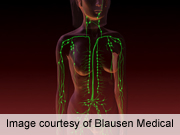Significant reduction in mean radiation dose to heart, with preservation of local control
FRIDAY, Jan. 16, 2015 (HealthDay News) — For patients with left breast cancer, radiation therapy with the Active Breathing Coordinator (ABC) can reduce the mean heart dose (MHD) by 20 percent or more, while preserving local control, according to a study published in the January-February issue of Practical Radiation Oncology.
Harriet Eldredge-Hindy, M.D., from Thomas Jefferson University in Philadelphia, and colleagues conducted a prospective trial to examine whether radiation therapy with ABC can reduce the MHD by ≥20 percent in patients with stages 0 to III left breast cancer. One hundred twelve patients were enrolled and 86 underwent simulation with free breathing and ABC for comparison of dosimetry. If the MHD was reduced by ≥5 percent, ABC was used during the patent’s radiation therapy course.
The researchers found that 81 patients received radiation therapy using ABC, representing 72 percent procedural success. Use of ABC reduced MHD by 20 percent or more in 88 percent of patients, representing achievement of the primary end point (P < 0.0001). The median value for absolute reduction in MHD was 1.7 Gy, and relative reduction was 62 percent. There was a significant dose reduction to the left lung with radiation therapy with ABC. Eight-year estimates of locoregional relapse, disease-free survival, and overall survival were 7, 90, and 96 percent, respectively.
“ABC was well tolerated and significantly reduced MHD while preserving local control,” the authors write.
Copyright © 2015 HealthDay. All rights reserved.








